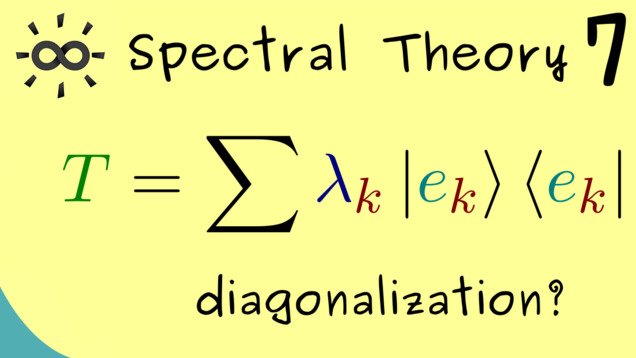
-
Title: Spectral Theorem for Compact Operators
-
Series: Functional Analysis
-
YouTube-Title: Functional Analysis 34 | Spectral Theorem for Compact Operators
-
Bright video: https://youtu.be/0a8zNP8kmSE
-
Dark video: https://youtu.be/roU6pTjf5h8
-
Ad-free video: Watch Vimeo video
-
Quiz: Test your knowledge
-
Dark-PDF: Download PDF version of the dark video
-
Print-PDF: Download printable PDF version
-
Thumbnail (bright): Download PNG
-
Thumbnail (dark): Download PNG
-
Subtitle on GitHub: fa34_sub_eng.srt missing
-
Timestamps (n/a)
-
Subtitle in English (n/a)
-
Quiz Content
Q1: Let $A$ be a matrix in $\mathbb{C}^{n \times n}$. Is $A$ diagonalisable in the sense that there exists an invertible matrix $T \in \mathbb{C}^{n \times n}$ such that $$ T^{-1} A T $$ is a diagonal matrix?
A1: Yes, it is always possible.
A2: This only works if one can find a basis $(e_1, \ldots, e_n)$ consisting of eigenvectors of $A$.
A3: No, it never is diagonalisable.
Q2: Let $A$ be a matrix in $\mathbb{C}^{n \times n}$. Is $A$ unitarily diagonalisable in the sense that there exists a unitary matrix $U \in \mathbb{C}^{n \times n}$ such that $$ U^{\ast} A U $$ is a diagonal matrix?
A1: Yes, it is always possible.
A2: This only works if $A$ is a normal matrix.
A3: No, it never is unitarily diagonalisable.
Q3: Let $X$ be a complex Hilbert space and $T: X \rightarrow X$ a self-adjoint compact operator. Which statement is not correct, in general?
A1: If $\lambda \neq \mu$ are two eigenvalues of $T$, then there are two eigenvectors $e_1$ and $e_2$ that are orthogonal.
A2: There is a finite or infinite sequence of eigenvalues $(\lambda_i)$ of $T$ with corresponding eigenvectors $(e_i)$ chosen as an orthonormal system.
A3: $T$ can be written as $$ T x = \sum_k \lambda_k e_k \langle e_k, x \rangle$$ for $x \in X$.
A4: The operator norm of $T$ is given by the maximum of the absolute value of the eigenvalues of $T$.
A5: $T = 0$ is not possible.
-
Last update: 2024-10